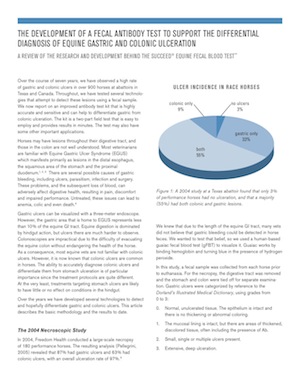
A review of the research and development behind the SUCCEED® Equine Fecal Blood Test™
Overview
Over the course of seven years, we have observed a high rate of gastric and colonic ulcers in over 900 horses at abattoirs in Texas and Canada. Throughout, we have tested several technologies that attempt to detect these lesions using a fecal sample. We now report on an improved antibody test kit that is highly accurate and sensitive and can help to differentiate gastric from colonic ulceration. The kit is a two-part field test that is easy to employ and provides results in minutes. The test may also have some other important applications.
Horses may have lesions throughout their digestive tract, and those in the colon are not well understood. Most veterinarians are familiar with Equine Gastric Ulcer Syndrome (EGUS) which manifests primarily as lesions in the distal esophagus, the squamous area of the stomach and the proximal duodenum.1, 2, 3 There are several possible causes of gastric bleeding, including ulcers, parasitism, infection and surgery. These problems, and the subsequent loss of blood, can adversely affect digestive health, resulting in pain, discomfort and impaired performance. Untreated, these issues can lead to anemia, colic and even death.4
Gastric ulcers can be visualized with a three-meter endoscope. However, the gastric area that is home to EGUS represents less than 10% of the equine GI tract. Equine digestion is dominated by hindgut action, but ulcers there are much harder to observe. Colonoscopies are impractical due to the difficulty of evacuating the equine colon without endangering the health of the horse. As a consequence, most equine vets are not familiar with colonic ulcers. However, it is now known that colonic ulcers are common in horses. The ability to accurately diagnose colonic ulcers and differentiate them from stomach ulceration is of particular importance since the treatment protocols are quite different. At the very least, treatments targeting stomach ulcers are likely to have little or no effect on conditions in the hindgut.
Over the years we have developed several technologies to detect and hopefully differentiate gastric and colonic ulcers. This article describes the basic methodology and the results to date.
Download the The Development of a Fecal Antibody Test PDF to read the full paper.




